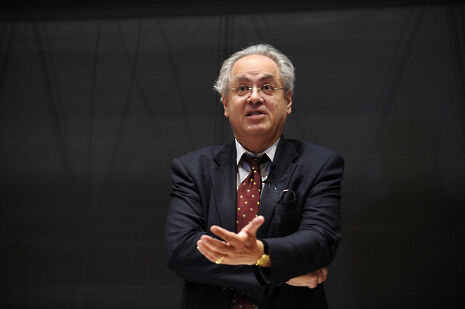Twitter and Facebook: making language a dying art?
Caius fellow David Abulafia claims students “are losing the ability to write continuous prose at length”

Professor David Abulafia, fellow of Gonville and Caius and a leading academic at the Faculty of History, has sparked debate by claiming that extensive use of social media is leading to a decline in young people’s writing skills.
“People do not know how to write. Command of grammar and punctuation is atrocious”, remarked Professor Abulafia at an event organised by the cente-right Politeia think tank, looking at the skills that should be tested at GCSE and A-level. He believes that the prevalence of such an inability “may reflect a society in which fewer young people read and much of their informal writing consists of Facebook and Twitter messages.”
“This is disastrous because people are losing the ability to write continuous prose at length”, he continues. Speaking to Varsity, Abulafia lamented the situation at the University of Cambridge itself, noteing that “Colleges and Faculties now offer ‘how to write an essay’ sessions for first years that would not have been thought at all necessary twenty years ago.” He argued that “the encouragement of a decent literary style in the humanities” is crucial and “pleads for a return to essay writing in the humanities”, citing a lack of preparation in school as compounding the problem of a lack of clear, elegant writing among today’s youth.
Not everyone shares Professor Abulafia’s views on the destructive nature of social media, however. Florence Gildea, 2nd year Pembroke historian and undergraduate representative at the Faculty of History, disagrees with his analysis saying, “I can’t help but think that while it may be a problem, poor spelling and grammar are hardly new.” She remarks that “inevitably with the expansion of attendance at universities we become aware of a much vaster proportion of the population”, a sociological shift which may account for the changing levels of literacy Gildea says.
Gildea highlights that “not all subjects taught at university are based on essay writing” and stresses that it may not be helpful to place “such a strong emphasis on these skills”, expressing the view that “spelling and grammar [are not] a reliable index for talent nor intelligence.” She continues, “I also feel the animosity towards Facebook and Twitter is something of a generational thing”.
Usage of sites such as Facebook and Twitter is widespread amongst university students and both tweets and updates are generally limited to a certain number of characters. Twitter, for example, limits messages to 140 characters. However, since Abulafia made his comments, Facebook has dramatically increased its status character allowance to over 63,000 characters, twenty three times longer than this article.
 News / Hundreds of Cambridge academics demand vote on fate of vet course20 February 2026
News / Hundreds of Cambridge academics demand vote on fate of vet course20 February 2026 News / University Council rescinds University Centre membership20 February 2026
News / University Council rescinds University Centre membership20 February 2026 News / Judge Business School advisor resigns over Epstein and Andrew links18 February 2026
News / Judge Business School advisor resigns over Epstein and Andrew links18 February 2026 News / Petition demands University reverse decision on vegan menu20 February 2026
News / Petition demands University reverse decision on vegan menu20 February 2026 News / Caius students fail to pass Pride flag proposal20 February 2026
News / Caius students fail to pass Pride flag proposal20 February 2026









